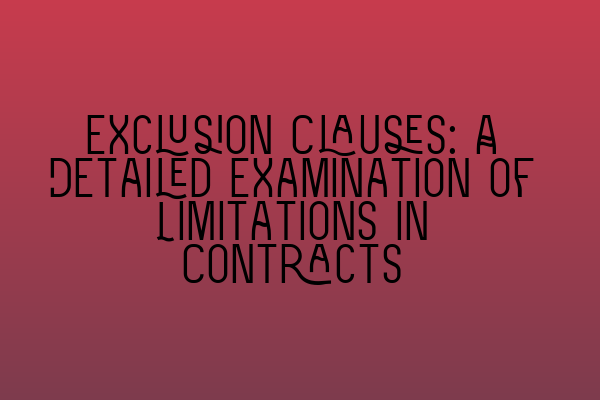Exclusion Clauses: A Detailed Examination of Limitations in Contracts
Contracts are the backbone of business transactions, ensuring that all parties involved understand their rights and obligations. Within these contracts, exclusion clauses are often included to limit liability and allocate risk between the contracting parties.
Exclusion clauses, sometimes referred to as exemption clauses or limitation clauses, are provisions that aim to exclude or limit one party’s liability for certain events or losses that may occur during the course of the contract. These clauses can significantly impact the rights and responsibilities of the parties involved. It is crucial for solicitors and contract law practitioners to have a comprehensive understanding of exclusion clauses and their implications.
The Purpose of Exclusion Clauses
The primary purpose of exclusion clauses is to protect one or both parties from liability for certain losses or events specified within the contract. These clauses are commonly utilized to:
- Limit liability for breach of contract
- Exclude liability for certain types of losses or damages
- Allocate risk between the parties
- Provide indemnification
- Protect against unforeseen circumstances
Understanding the purpose behind the inclusion of exclusion clauses in contracts is essential for both solicitors drafting contracts and clients reviewing them. It helps ensure that the interests of all parties are adequately protected and that the allocation of risk is fair and reasonable.
Types of Exclusion Clauses
Exclusion clauses can take various forms, each having different implications. It is crucial to be familiar with the different types of exclusion clauses that can be encountered in contracts:
- Exclusion of liability for negligence: This type of clause aims to exclude liability for losses resulting from a party’s negligence.
- Exclusion of liability for consequential damages: These clauses seek to exclude liability for indirect or consequential damages that may arise as a result of a breach of contract.
- Exclusion of liability for personal injury: Some contracts may attempt to exclude liability for personal injury or death caused by a party’s actions or omissions.
- Exclusion of implied warranties or conditions: These clauses aim to exclude certain implied warranties or conditions provided by statute or common law.
- Exclusion of liability for specific events: Contracts may include clauses that exclude liability for specific events or occurrences, such as force majeure events or acts of God.
It is crucial for solicitors and clients to carefully consider the wording of exclusion clauses to ensure they accurately reflect the intentions of the parties and comply with applicable laws and regulations.
Validity and Interpretation of Exclusion Clauses
While exclusion clauses can offer protections, their validity and interpretation can be subject to judicial scrutiny. Courts will examine these clauses to ensure they are fair and reasonable, considering factors such as:
- Contra proferentem rule: This rule states that any ambiguity or uncertainty in an exclusion clause is interpreted against the party seeking to rely on it.
- Unfair Contract Terms Act 1977 (UCTA): UCTA provides additional protection to consumers and imposes limits on the extent to which parties can rely on exclusion clauses.
- Reasonableness: Courts assess the reasonableness of an exclusion clause by considering factors such as the bargaining power of the parties, the availability of alternatives, and whether the clause was individually negotiated.
It is crucial for solicitors to draft exclusion clauses that are clear, unambiguous, and comply with applicable laws to enhance their enforceability and protect their clients’ interests.
The Importance of Seeking Legal Advice
Given the potential legal implications and complexities associated with exclusion clauses, it is highly recommended for individuals and businesses to seek legal advice from experienced solicitors. Legal professionals with expertise in contract law can provide invaluable guidance on drafting, reviewing, and negotiating contracts to ensure the inclusion of fair and enforceable exclusion clauses.
If you would like to learn more about legal practice and decision-making, you can read our related article: Unveiling Real-Life Case Studies: Insights into Legal Practice and Decision-Making.
To understand how solicitor salaries are determined in the UK and the factors that affect income, our article on Exploring Solicitor Salaries in the UK: Average Earnings and Factors Affecting Income provides valuable information.
For solicitors looking to enhance their client relationship management skills and build trust and loyalty, our article on Mastering Client Relationship Management: Skills for Solicitors to Enhance Trust and Loyalty offers useful insights.
If you are considering pursuing a law school education in the UK and need guidance on choosing the right path for your future, we recommend reading our article on Pursuing a Law School Education in the UK: Choosing the Right Path for Your Future.
Finally, if you are aspiring to become a solicitor and want to understand the roadmap to securing training contracts, our article on Securing Training Contracts: A Roadmap to Becoming a Solicitor provides a comprehensive guide.
Remember, proper understanding and utilization of exclusion clauses can significantly impact the success and protection of contractual relationships. Seek professional legal advice to ensure your contracts are robust and tailored to your specific needs.
